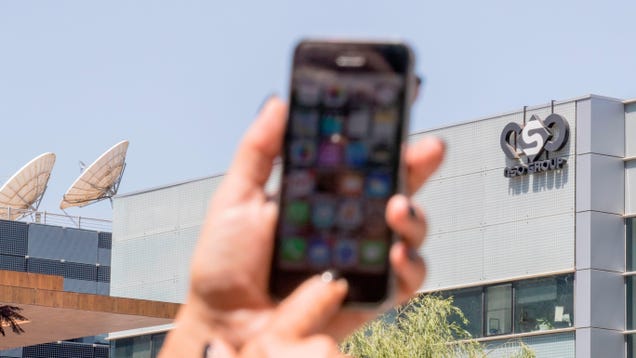Cellphones “can be transformed into surveillance devices,” writes the Guardian, reporting startling new details about which innocent people are still being surveilled (as part of a collaborative reporting project with 16 other media outlets led by the French nonprofit Forbidden Stories).
Long-time Slashdot reader shanen shared the newspaper’s critique of a “privatised government surveillance industry” that’s made NSO a billion-dollar company, thanks to its phone-penetrating spy software Pegaus:
[NSO] insists only carefully vetted government intelligence and law enforcement agencies can use Pegasus, and only to penetrate the phones of “legitimate criminal or terror group targets”. Yet in the coming days the Guardian will be revealing the identities of many innocent people who have been identified as candidates for possible surveillance by NSO clients in a massive leak of data… The presence of their names on this list indicates the lengths to which governments may go to spy on critics, rivals and opponents.
First we reveal how journalists across the world were selected as potential targets by these clients prior to a possible hack using NSO surveillance tools. Over the coming week we will be revealing the identities of more people whose phone numbers appear in the leak. They include lawyers, human rights defenders, religious figures, academics, businesspeople, diplomats, senior government officials and heads of state. Our reporting is rooted in the public interest. We believe the public should know that NSO’s technology is being abused by the governments who license and operate its spyware.
But we also believe it is in the public interest to reveal how governments look to spy on their citizens and how seemingly benign processes such as HLR lookups [which track the general locations of cellphone users] can be exploited in this environment.
It is not possible to know without forensic analysis whether the phone of someone whose number appears in the data was actually targeted by a government or whether it was successfully hacked with NSO’s spyware. But when our technical partner, Amnesty International’s Security Lab, conducted forensic analysis on dozens of iPhones that belonged to potential targets at the time they were selected, they found evidence of Pegasus activity in more than half.
The investigators say that potential targets included nearly 200 journalists around the world, including numerous reporters from CNN, the Associated Press, Voice of America, the New York Times, the Wall Street Journal, Bloomberg News, Le Monde in France, and even the editor of the Financial Times.
In addition, the investigators say they found evidence the Pegasus software had been installed on the phone of the fiancée of murdered Saudi journalist Jamal Khashoggi. NSO denies this to the Washington Post. But they also insist that they’re simply licensing their software to clients, and their company “has no insight” into those clients’ specific intelligence activities.
The Washington Post reports that Amnesty’s Security Lab found evidence of Pegasus attacks on 37 of 67 smartphones from the list which they tested. But beyond that “for the remaining 30, the tests were inconclusive, in several cases because the phones had been replaced. Fifteen of the phones were Android devices, none of which showed evidence of successful infection. However, unlike iPhones, Androids do not log the kinds of information required for Amnesty’s detective work.”
Familiar privacy measures like strong passwords and encryption offer little help against Pegasus, which can attack phones without any warning to users. It can read anything on a device that a user can, while also stealing photos, recordings, location records, communications, passwords, call logs and social media posts. Spyware also can activate cameras and microphones for real-time surveillance.
Read more of this story at Slashdot.
![]()
Source: Slashdot – Investigation Reveals Widespread Cellphone Surveillance of the Innocent









